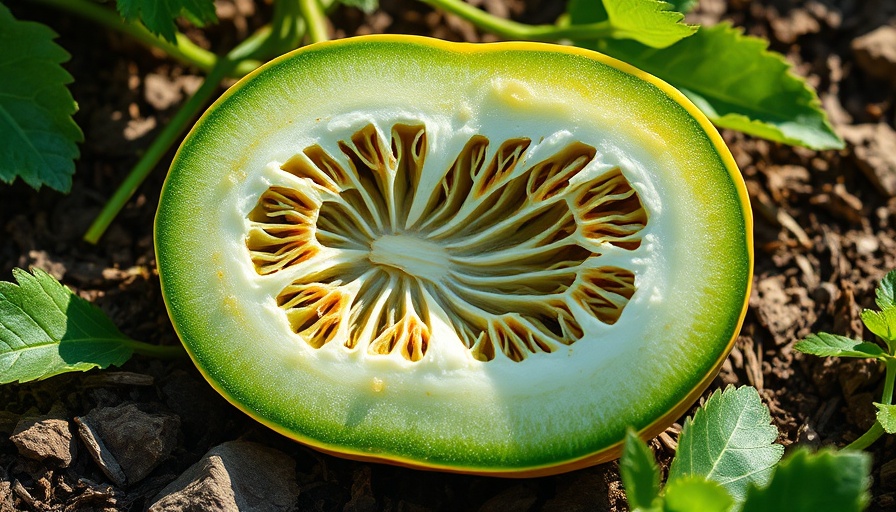
Discover the Versatility of Winter Melon This Season
Winter melon (Benincasa hispida), often referred to as ash gourd or wax gourd, is an amazing addition to your kitchen during the colder months. Unlike typical winter vegetables, this melon thrives during warmer temperatures but can be stored well into winter, offering a plethora of culinary options. With its extraordinary ability to retain flavor and freshness over an extended period, the winter melon is not only practical but also packed with health benefits.
Growing Your Winter Melon: A Gardener's Delight
Growing winter melons can transform your gardening and cooking experience. These vines require a warm climate to flourish and take approximately 90 days to mature. They can grow over 20 pounds and can be trained on a trellis to save space. According to gardening expert Olivia from The Tender Gardener, warm summer months are ideal for planting winter melons. Providing at least six hours of sunlight and well-draining soil will yield a bountiful harvest. Some gardeners even reported harvesting over 50 melons from a single plant. Whether you are an experienced gardener or a novice, winter melons can gain you valuable gardening experience while enriching your culinary journey.
A Cultural Culinary Connection
In various Asian cuisines, winter melon plays a significant role. In Vietnamese kitchens, it features in delicious soups like *canh bi dao*, whereas Indian cooks incorporate it into rich curries. In China, it is often used in stews with pork and barley. The winter melon’s ability to absorb flavors makes it a delightful addition to various dishes. You might be surprised to know that although it has a mild taste, the winter melon wonderfully balances richer flavors of soups and stir-fries.
Winter Melon's Health Benefits
Not only is winter melon versatile in the kitchen, but it also comes packed with health benefits. It is low in calories—composed of about 96% water—making it a fantastic option for those looking to maintain or lose weight. The fiber content supports digestive health, potentially reducing the risk of type 2 diabetes. These attributes make winter melons a popular ingredient for health-conscious consumers. Additionally, incorporating this melon into your diet can promote hydration and reduce inflammation.
Creative Culinary Uses for Winter Melon
From soups and stews to snacks and desserts, the winter melon’s versatility can bring exciting flavors to your dining table. Some creative options include:
- Stir-fried Winter Melon: A quick stir-fry with fermented black beans and peppers can make for a light yet flavorful dish.
- Winter Melon Soup: Combine winter melon with pork and ginger for a nutritious and comforting soup.
- Winter Melon Tea: Use the dehydrated gourd to make a sweet and aromatic tea that is traditionally enjoyed in many cultures.
- Candied Winter Melon: Another popular choice is to create crunchy candies, which makes a delightful snack.
Pro Tips for Storing Winter Melon
Understanding how to properly store your harvested winter melon is crucial for preserving its freshness. Ideally, it should be kept in a cool, dry place, unwashed and whole. Once cut, you’ll want to wrap it in plastic and keep it refrigerated, where it can last for about a week. This ensures you maximize the time you have to enjoy this fantastic vegetable in your winter cooking.
The Community Connection
Growing winter melons can be more than just a personal achievement; it can cultivate community connections as well. Sharing your bountiful harvest with neighbors may lead to exchanges of seeds and recipes, further enriching your gardening experience. As Olivia shared, her encounters with neighbors increased tremendously as they sought to learn about her gardening journey. This communal aspect can transform gardening into a shared experience filled with relationship-building and knowledge sharing.
Conclusion: Why You Should Embrace Winter Melon
Incorporating winter melon into your garden and kitchen not only benefits you with healthy eating options but also connects you to a broader cultural culinary experience. As winter approaches, consider planting and experimenting with this unique melon. Not only will it add variety to your meals, but it can also deepen your relationships with those around you as you share the joys of gardening and cooking. Dive into the world of urban farming, embrace sustainable agriculture, and elevate your home cooking with the extraordinary winter melon!
 Add Row
Add Row  Add
Add 




Write A Comment